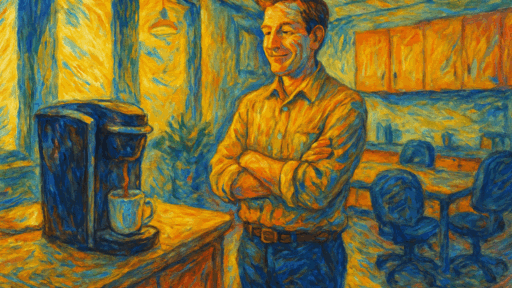“The trouble with having a family is that children grow out of childhood, but parents never grow out of parenthood.”
Robert Breault
Our house has a door that sticks.
Not always—just often enough to remind us we live in a place with opinions.
Some months it closes with a satisfying click, like a door in a house that pays its taxes early. Other months it behaves more like interpretive art. You pull it, and it stops an inch short, sulking. You pull again, and it just…stands there. A door with doubts.
When that happens, we all know the move. Part muscle memory, part gentle exorcism. You lean your hip into it, angle the knob just right, and give it a firm-but-loving shove.
It’s not violent. It’s coaxing. And when it finally gives in, there’s that soft groan—the sound of wood remembering how it fits.
We were going to fix it. Of course we were.
I even Googled a few things, which, in our house, is the emotional equivalent of calling a contractor.
But we never did. The urgency faded, the seasons shifted, and now it only acts up sometimes—just enough to remind us we’ve been here a while. Long enough to know how the house moves.
There are things in life you live with not because you’ve given up, but because you’ve adapted.
Things that don’t always work the way they should, but still work.
Things you learn, over time, how to move through.
Like a door.
Like a house.
Like each other.
Every summer, we take the boys to a resort in the Texas Hill Country. It’s part spa, part state fair—equal parts chlorine and chaos.
When the kids were little, it was an all-hands-on-deck kind of vacation.
They couldn’t swim. They wore life vests shaped like sea creatures and clung to us like barnacles.
We were lifeguards, snack distributors, human sunscreen stations. Parents carrying goggles and half-eaten chicken tenders with no idea how either got there.
Now we travel with teenagers.
Teenagers are funny—you pack for them, pay for them, and then barely see them.
This year we brought one of their friends. Which meant, of course, we saw them even less.
They’d appear briefly for breakfast, maybe dinner, and then vanish into the semi-supervised freedom of adolescence and a resort wristband.
At first, Shelley felt it—the stillness. The quiet. The missing background noise of small hands grabbing for yours.
I, being helpful, suggested this was a wonderful opportunity to nap and eat food while it was still hot.
She gave me a look that said, I miss them. And if you keep talking, I might start missing you too.
So we floated. We lounged. We did adult things like make dinner reservations instead of promises to clean up spills.
But every now and then, I’d find myself scanning the pool, expecting to see two little heads bobbing in the water. Calling for me. Needing me.
Instead, they were somewhere else—confident, independent, towel-less, probably.
I used to think that needed fixing.
That if they pulled away, I should pull harder.
But the truth is, we all shift.
With time. With growth. With sunscreen that no one wants to reapply.
Some days, I move through life smoothly—saying the right things, remembering to defrost the chicken.
Other days, I’m that door.
Resistant. Swollen with something I can’t name. Requiring patience, maybe a hip-check, maybe a snack.
And maybe the point isn’t to stay perfectly aligned—but to keep showing up when things don’t quite fit.
There are still half-primed spots on our walls. A drawer that only closes if you whisper encouragement. A floor lamp that flickers like it’s auditioning for a disco.
We used to think we’d fix all of it.
Now I’m not so sure.
Because some things don’t need fixing. They just need knowing.
That’s how you learn a house.
And maybe it’s how you learn each other, too.
Not by perfecting—but by staying long enough to memorize the quirks.
To know where things stick.
To know how to open them anyway.
The boys will come back eventually.
Not all the way—just enough.
Enough to sit at the kitchen counter again.
Enough to ask what we’re doing this weekend.
Enough to open the door with the exact rhythm we all know, and walk back in like it’s nothing.
And I’ll be here.
A little older. A little uneven.
Still shifting with the seasons.
Still standing.






